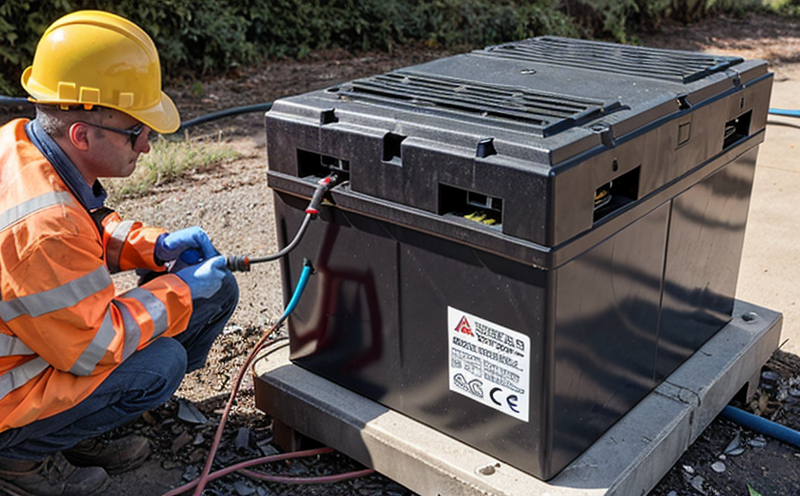BS EN 50342 Automotive Lead-Acid Starter Battery Testing
The BS EN 50342 standard is specifically designed to ensure that automotive lead-acid starter batteries meet the stringent requirements for performance, durability, and safety. This standard applies primarily to starting, lighting, and ignition (SLI) batteries used in various vehicle types including passenger cars, motorcycles, trucks, and buses.
The testing protocol under this standard is comprehensive, covering a range of critical parameters such as cold cranking current (CCC), reserve capacity (RC), and high-rate discharge performance. These tests are crucial for ensuring the reliability and safety of automotive batteries in challenging environmental conditions like extreme temperatures. The CCC test measures the maximum amount of electrical current that a battery can provide at 0°C, which is essential for starting an engine quickly under cold conditions.
The reserve capacity test evaluates how long a battery can power essential vehicle functions such as headlights and radio after it has been completely discharged by a starter motor. This ensures that the battery provides sufficient power to maintain vehicle safety features during prolonged start attempts or in case of alternator failure.
The high-rate discharge performance test assesses the battery's ability to deliver current at a rapid rate, which is vital for starting large engines and heavy-duty vehicles. The testing process involves precise measurement techniques and controlled environmental conditions to ensure accurate results.
For each test, there are specific methodologies that must be followed strictly. For instance, the CCC test requires the use of a specialized bench-top tester capable of simulating real-world engine start conditions. Similarly, the reserve capacity test is conducted using standardized discharge equipment that can accurately measure current draw over time.
Preparation of specimens for testing includes ensuring the battery is fully charged and at ambient temperature before any tests are performed. This ensures consistent and reliable results across multiple samples. The instrumentation used in these tests includes advanced data acquisition systems capable of recording all relevant parameters during each test cycle.
The BS EN 50342 standard also specifies detailed acceptance criteria for all tested parameters. A battery must pass all specified tests to be certified as compliant with the standard. Compliance ensures that automotive lead-acid batteries meet the necessary performance and safety standards, enhancing vehicle reliability and reducing the risk of breakdowns.
| Parameter | Description | Acceptance Criteria |
|---|---|---|
| Cold Cranking Current (CCC) | The maximum current a battery can provide at 0°C. | Must meet or exceed the specified value for the battery's capacity rating. |
| Reserve Capacity | The time in minutes that a fully discharged battery will run essential vehicle functions. | Must be at least as long as required by the standard, typically 45 to 90 minutes depending on the battery's capacity. |
| High-Rate Discharge Performance | The ability of a battery to deliver current at a rapid rate. | Must demonstrate sufficient power output as specified in the standard for different capacities. |
Applied Standards
The BS EN 50342 standard is complemented by other relevant international standards such as ISO 6819, which provides additional guidance on the design and construction of lead-acid batteries. These standards work together to ensure that automotive lead-acid starter batteries are not only reliable but also safe for use in various vehicles.
The BS EN 50342 standard specifically addresses the performance requirements for SLI batteries used in cars, motorcycles, trucks, and buses. It covers a wide range of tests including those mentioned earlier such as cold cranking current, reserve capacity, and high-rate discharge performance. Compliance with these standards is essential for manufacturers to ensure their products meet regulatory requirements.
For testing laboratories like Eurolab, adherence to these standards is critical. Our team uses state-of-the-art equipment and follows strict protocols to ensure accurate and reliable test results. This not only helps our clients in meeting regulatory requirements but also enhances the quality and safety of their products.
Eurolab Advantages
At Eurolab, we pride ourselves on offering unparalleled expertise and comprehensive testing services for automotive lead-acid starter batteries. Our team of highly qualified professionals is dedicated to ensuring that our clients' products meet the highest standards of quality and reliability.
We have invested in cutting-edge equipment and infrastructure to provide precise and accurate test results. Our facilities are equipped with advanced battery testers capable of simulating real-world conditions, ensuring that we can accurately assess a battery's performance across all specified parameters.
Our commitment to quality is further demonstrated by our strict adherence to international standards. We ensure that every test conducted at Eurolab meets the rigorous requirements set forth in BS EN 50342 and other relevant standards. This commitment to excellence has earned us a reputation for reliability and accuracy among industry leaders.
In addition to our technical expertise, we also offer personalized services tailored to meet the specific needs of each client. Our experienced team works closely with clients to understand their requirements and provide customized testing solutions. We are committed to helping our clients stay ahead in the competitive automotive battery market by ensuring they have reliable and compliant products.
Quality and Reliability Assurance
EuroLab's commitment to quality assurance is reflected in every aspect of our operations. From initial consultation through final certification, we ensure that all processes are conducted with the highest level of precision and reliability.
We employ a team of seasoned professionals who bring extensive experience and knowledge to each project. Our rigorous quality control measures include comprehensive training programs for staff and regular audits of our facilities to maintain compliance with industry standards.
The use of advanced instrumentation and software ensures that all data is accurately captured and analyzed. This allows us to provide detailed reports that are not only informative but also actionable, helping clients identify areas for improvement or optimization.
We also offer post-testing support services where necessary, ensuring full client satisfaction from start to finish. Our goal is to build long-term relationships with our clients by providing exceptional service and support throughout the product development lifecycle.





